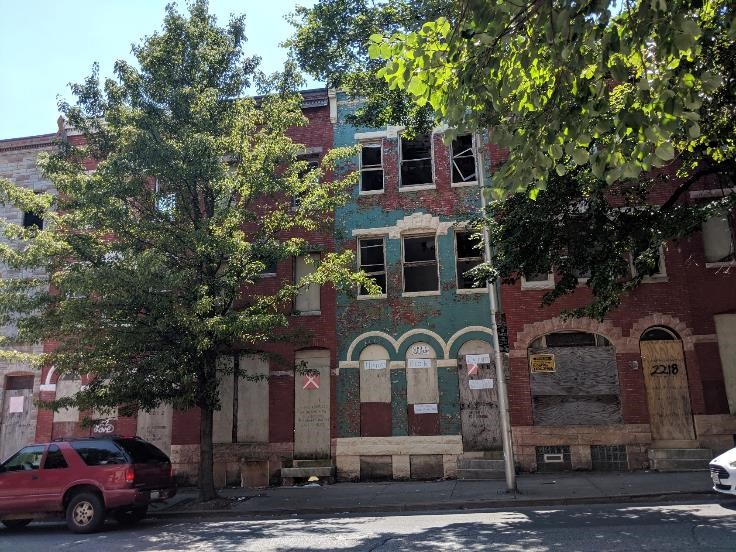CHAP Findings on 2216 Druid Hill Avenue
Request for temporary designation
In May 2019, the staff of the Commission for Historical and Architectural Preservation (CHAP) received requests to temporarily designate 2216 Druid Hill Avenue as a landmark in order to prevent demolition while people built a coalition to save it. The requestors informed staff that world-renowned entertainer Cab Calloway had lived at this address during his youth in Baltimore. 2216 Druid Hill Avenue, as part of the block of addresses 2204-2230 Druid Hill Avenue, was approved for demolition in 2018 under Phase 3 of Project C.O.R.E. (Creating Opportunities for Renewal and Enterprise), and planning was underway to make the whole block a park under the Baltimore City Department of Planning's Green Network Plan.

Staff conducted research into Cab Calloway’s history in Baltimore and presented the preliminary findings to the Commission during the briefing session of the June 11, 2019 CHAP hearing. The Commission requested that staff conduct a conditions assessment of 2216 Druid Hill Avenue and the rest of the rowhouses on the block. Staff presented the conditions assessment during the briefing session of the July 9, 2019 CHAP hearing. Staff found that 2216 Druid Hill Ave. and other houses on the block were condemned, many were marked with an “X”, (meaning that they were unsafe for emergency personnel to enter), and that the block as a whole was in poor condition and would require significant financial investment to be saved. The Commission also learned about the park proposed for the site from Kim Knox, Greening Coordinator of the Green Network Plan. The Commission did not request that staff pursue landmark designation for the property at the July 9, 2019 hearing.
Reconsideration and additional research
At the briefing session of the December 10, 2019 hearing of the Commission for Historical and Architectural Preservation, staff presented that Andrew J. Reed, the last President of the Civil Rights organization the Mutual United Brotherhood of Liberty, may have lived at 2216 Druid Hill Avenue. The Commission directed staff to request that Baltimore City Department of Housing and Community Development stay the demolition of 2216 Druid Hill Avenue for 90 days so that CHAP staff had time to review this new information. Staff then undertook a comprehensive study of Cab’s life in Baltimore, as well as that of his immediate family members in order to ensure that staff had a holistic understanding of 2216 Druid Hill Ave. and its residents, and all of the places where Cab Calloway and his extended family lived in Baltimore.
This research in the resultant report completed in December 2019 incorporated information from Cab’s autobiography, a biography, and numerous primary sources. This report provides the most comprehensive investigation of Cab Calloway’s life in Baltimore completed to date.
In this report, staff determined the following:
- Andrew Reed, civil rights leader and Cab’s grandfather, never lived at 2216 Druid Hill Avenue.
- Three of the five homes that Cab lived in as a child in Baltimore still stand today:
- 1316 N. Carey Street was home to his maternal grandmother Annie Creddit Reed, who taught vocal and instrumental music to her entire family, including Cab, and was the residence that Cab recalled most fondly. Cab, his mother, and siblings lived here for two years.
- 2216 Druid Hill Avenue was home to Cab, his mother, step-father, and siblings, who lived in an apartment in this property for approximately five years.
- 1001 E. 43rd Street in the suburban African American enclave of Wilson Park, was a rental property owned by prominent businessman and Cab’s kin, Harry O. Wilson. Cab’s family lived here for over three years and was where he Cab stated he began to get back into music.
Based on staff’s research, 2216 Druid Hill Avenue is not recommended as the best site to honor Cab Calloway’s legacy in Baltimore. Instead, staff has determined that other sites would be better to honor and celebrate the legacy of Blanche and Cab Calloway. CHAP staff is now currently working with its city partners, neighborhood stakeholders, and other partners to not only celebrate the legacy of Cab and Blanche Calloway, but to celebrate the history and culture of this community.
The CHAP documents embedded above are also available here:
In June 2020, Councilman Leon Pinkett introduced legislation to designate Cab's maternal grandmother's home at 1316 N. Carey Street as a Baltimore City Landmark, with the landmark name of Reed Calloway House, to honor both the Reed and Calloway families that lived in that house, and shaped both Blanche and Cab Calloway, and the City of Baltimore. This legislation was recommended for approval by the Commission for Historical and Architectural Preservation at their August 11, 2020 Hearing, and will be considered by the Planning Commission at their September 10, 2020 Hearing. The landmark designation report for the Reed Calloway House is available here.